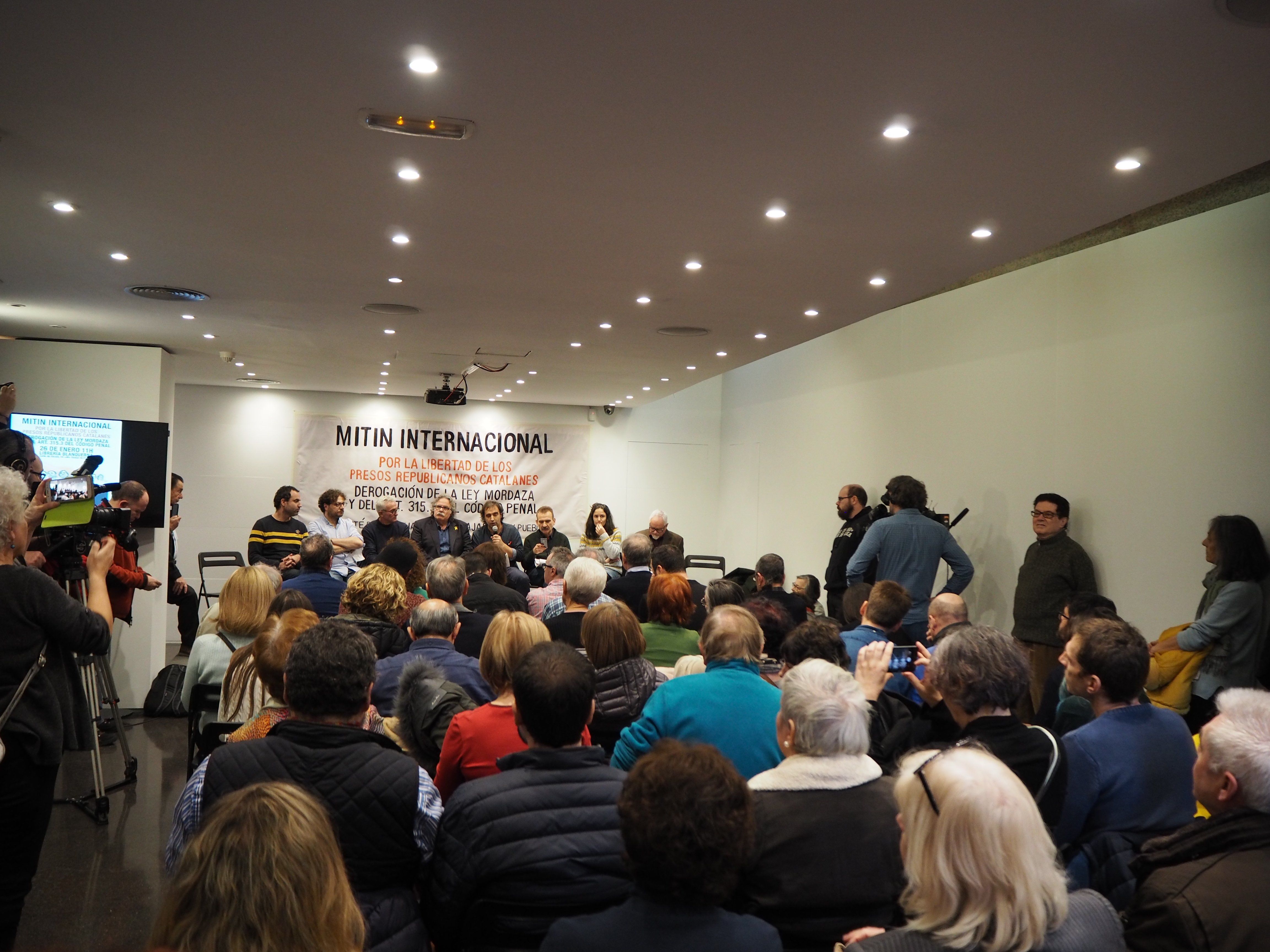In the end, it went ahead in the heart of Madrid. The meeting calling for the Catalan political prisoners to be freed had been vetoed by its original venue, the headquarters of the Ateneo de Madrid cultural organization, but took place this Saturday in the events hall of the Blanquerna bookshop, where republican and union movements figures from around the Spanish state gathered, including Spanish deputies such as Joan Tardà of ERC (Catalan Republican Left) and Diego Cañamero (Unidos Podemos). "We wanted to give visibility to a fact that people want to hide: that in Spain there are political prisoners," the organizers asserted. The hall was full to overflowing.
Juan Miguel Fernández, of the organizing Committee for the Workers 'and Peoples' Alliance, began the act by declaring that "pressure from all the powers that be" had led to the Ateneo's veto. However, he expressed his contentment that the event was being held. "It affects us all. It's not a Catalan problem, it's a problem for all republicans in Spain," said Fernández.
The act was held to call for the "freedom of the Catalan republican prisoners", as well as the repeal of Spain's Public Safety Act, the so-called "gag law" and the striking out of article 315.3 of the criminal code, which provides for jail sentences for picket action during a strike.
On behalf of the prisoners, Ferran Civit of the Catalan Association for Civil Rights stated his gratitude to all those who had turned out. "Thanks from all the prisoners and exiles, politically persecuted," said Civit, adding that, although "the trial verdict was already decided," the pro-independence leaders will not give up. "When we defend one right, we are defending them all," he asserted.
"We do not legitimize the Bourbon restoration"
Joan Tardà argued that "Catalan republicanism has never legitimized the Bourbon restoration," in reference to the Spanish royal family, and he expressed his solidarity with the rest of the peoples of the Spanish state. "In Catalan republicanism we have always felt that this is something we should defend," said ERC spokesman in the Congress. "In addition to being republicans, we are deeply Iberianist. Long live the Third Spanish Republic and long live the Catalan Republic!" he exclaimed.
Catalan National Assembly president Elisenda Paluzie, who came from Barcelona for the meeting, communicated the gratitude of her predecessors at the head of the independence civil group, Carme Forcadell and Jordi Sànchez, who are both facing demands of 17 years' imprisonment from the public prosecutor. "[The authorities] are trying to convert a right into a crime," stated Paluzie. "The first blow is against the right to self-determination, and from there all other abuses follow," she said, reiterating: "This is their goal, to block the right to self-determination."
Unidos Podemos deputy Diego Cañamero warned that "the Catalan problem cannot be resolved through the use of decrees or of boots, but rather by votes." He called for the mobilization of trade unions and social movements. "It's very important that people never forget that their parliament is the street," said Cañamero.
Pablo García, of the Comisiones Obreras union, also spoke at the meeting, on a personal basis, stating that, although he didn't agree with what the pro-independence leaders had done, the time they had spent in prison and the accusations against them were "barbaric". "In our organizations we must raise our voices throughout Spain," he said. Another who appeared was UGT union leader José Miguel Villa, who spoke of "the pressure against organizations such as Comisiones Obreras and UGT so that we don't come here and express our views." He called for not only the release of thsoe currently jailed, but the termination of all judicial persecution because "they haven't committed any crime".
German, French and Portuguese trade unionists also took part, calling for the freedom of the "Catalan political prisoners" and denouncing the "illegal trials".

